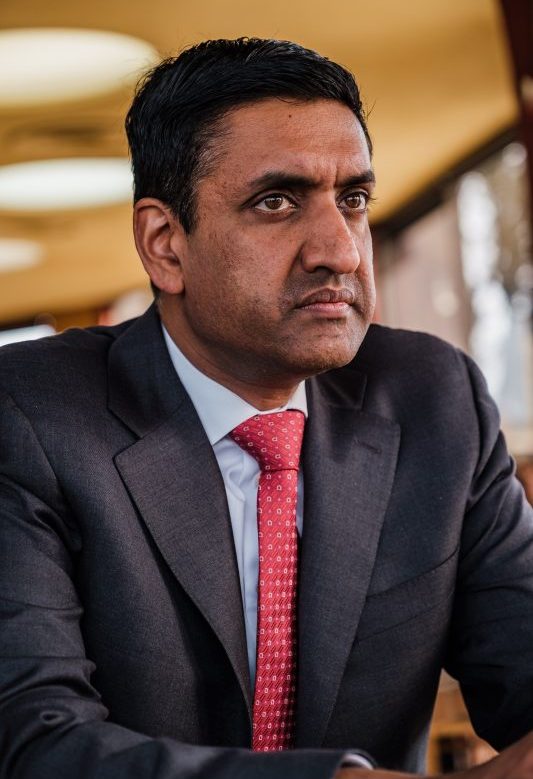
Democrats plan four-hour live stream with Twitch and YouTube stars
On Friday morning, Rep. Ro Khanna (D-Calif.) will kick off a four-hour live stream from a Washington rooftop overlooking the White House with some of the biggest political Twitch and YouTube live-streamers.
The creators include Clara Sorrenti, known online as Keffals; Steven Bonnell, known online as Destiny; and Ian Kochinski, known online as Vaush. The agenda says they will discuss issues such as climate change, affordable housing and student debt relief.
But the significance of the event may be what it says about the way Democrats and Republicans are seeking to engage with potential voters online.
“The new generation of Americans aren’t getting their news from MSNBC, CNN or Fox,” Khanna, who represents Silicon Valley in Congress, told The Washington Post. “That’s just not how millennials and Gen Z consume news or get inspired. One of the ways they’re making decisions is engaging with streamers. It’s the equivalent of talk radio or cable for the new generation.”
Republicans have embraced content creators in the past, with Donald Trump inviting several to campaign events and the White House when he was president. But the outreach can be controversial. More recently, Republican presidential candidate Vivek Ramaswamy has advocated leaning harder into TikTok and YouTube, posting videos showing a behind-the-scenes look at life on the campaign trail and dancing with controversial internet celebrity Jake Paul.
That effort drew a rebuke at Wednesday’s Republican presidential debate from Nikki Haley, a former ambassador to the United Nations, who called Ramaswamy’s efforts “infuriating,” adding that she believes TikTok is “dangerous.”
“I have a radical idea for the Republican Party,” Ramaswamy responded. “We need to win elections. And part of how we win elections is reaching the next generation of young Americans where they are.”
Seventy percent of viewers on Twitch, which is owned by Amazon, are ages 18 to 34, according to the company. (Amazon founder Jeff Bezos owns The Washington Post. Interim Post CEO Patty Stonesifer serves on Amazon’s board of directors.)
Khanna’s planned stream is just the latest way Democrats are targeting young people. In October 2020, Rep. Alexandria Ocasio-Cortez (N.Y.) played the video game “Among Us” on Twitch along with a cadre of streamers. These efforts are meant to deepen Democrats’ relationships with that community, organizers said.
“If you’re an establishment Democrat and you ignore the streamers, that would be foolish,” said Cenk Uygur, host of “The Young Turks,” a network of streaming shows on Twitch and YouTube with more than 25 million subscribers. “They’re very significant in size, and they reach younger voters. Even for progressives, oftentimes they view streamers as an afterthought or an add-on. But there’s a mountain of young voters there.”
The Biden administration has made an effort to partner with content creators, briefing TikTok creators on Ukraine, coronavirus vaccines and other topics. On Wednesday night, the White House hosted a reception for TikTok stars who are in the area for this weekend’s VidCon Baltimore convention, a gathering of online creators.
But the White House did not invite any of the big Twitch and YouTube streamers.
On Thursday, Christian Tom, director of the White House’s Office of Digital Strategy, told an audience of content creators and industry executives at VidCon that for the first time there is a specific team at the White House dedicated to forging partnerships with content creators.
“The idea of working with celebrities isn’t new, but the entire nature of what celebrity means today is,” he said. He also called President Biden a content creator himself and touted some of the White House’s digital reach, noting that it has amassed more than 93 million followers across platforms.
“The work we do with creators has the most upside and potential of all the communications methods we employ,” Tom said. “Whether it’s spicy tweets from @WhiteHouse, or our work with creators, it’s about how we can find a way to appear in the feed in a way that feels authentic, organic and ultimately surprises you.”
Khanna said engaging with streamers can make establishment politicians uncomfortable.
“When you have these streaming conversations, you can’t stick to talking points,” he said. “It’s very, very unscripted. People get a sense of who you are, and you may get put in positions that are a bit uncomfortable. But I think that’s exactly what younger voters want. They don’t want standard talking points.”
Live-streamers have played a growing role in politics. Political streamer Hasan Piker rose to the top of Twitch after he streamed live election coverage for more than 80 hours during the 2020 election and has built an audience of hundreds of thousands for his progressive commentary on issues.
Bonnell mobilized his fan base to canvass for Democratic politicians during the Georgia runoff for two vacant U.S. Senate seats. He booked travel and paid for hotel rooms for volunteers canvassing for the winning Democrats, Jon Ossoff and Raphael G. Warnock.
During the special election for a vacant seat on the Wisconsin Supreme Court, Bonnell’s and Kochinski’s communities knocked on more than 10,000 doors and made 50,000 phone calls supporting the Democrat who ultimately won, now-Chief Justice Janet Protasiewicz.
Bonnell said he hopes other streamers can exert influence as the 2024 election season approaches. “As political commentators, we have a lot to say about the current state of politics in the United States,” he said, “but sometimes it feels a little sad that we’re not doing more. I, and along with a few other people, are trying to get our fan bases together to go out and hopefully affect some type of real-world change across the political landscape in America.”
